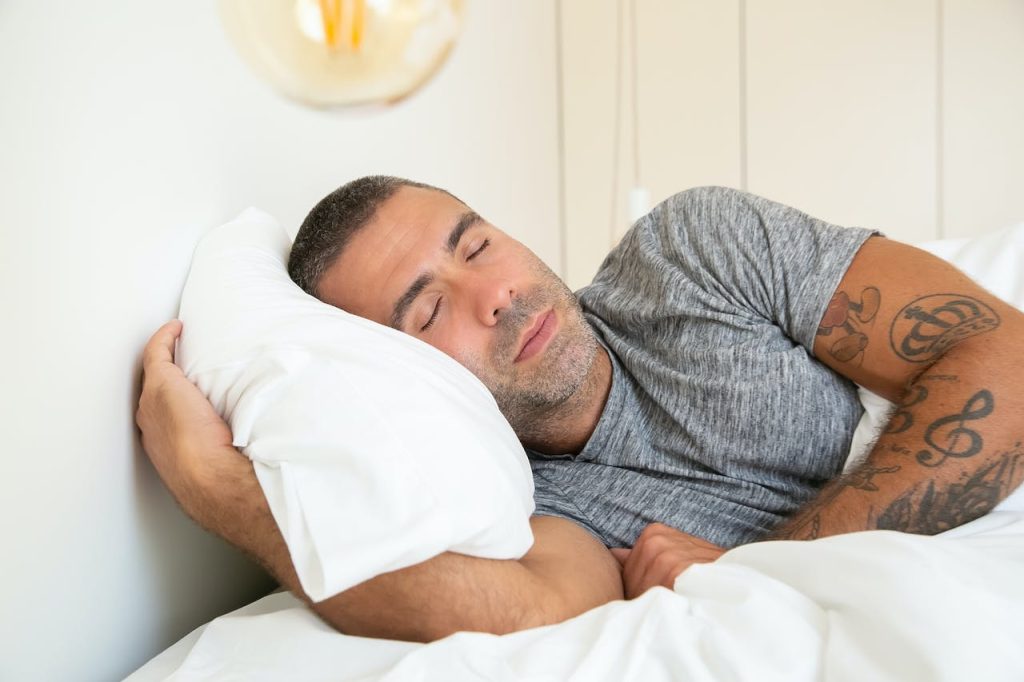Can good sleep help you lose weight: The amount of sleep you get could also be simply as important for weight loss as your diet and exercise. Evidence shows that sleep stands out as the lacking issue for a lot of people trying to lose weight.
Unfortunately, many people aren’t getting enough sleep.
In reality, about 35% of US adults are sleeping fewer than 7 hours most nights, in response to the Centers for Disease Control and Prevention (CDC). Getting fewer than 7 hours of sleep at evening is taken into account brief sleep (1Trusted Source).
Here are 6 the reason why getting enough sleep might provide help to lose weight.
Table of Contents

1. May provide help to keep away from weight gain related to brief sleep
Short sleep — often defined as fewer than 6–7 hours — has been repeatedly linked to the next body mass index (BMI) and weight gain.
One evaluation of 20 studies including 300,000 people found a 41% increased weight problems risk amongst adults who slept fewer than 7 hours per evening. In distinction, sleep was not an element in the event of weight problems in adults who slept longer (7–9 hours per evening) (2Trusted Source).
Another examine found brief sleep period to be considerably related to higher waist circumference, which is an indicator of the buildup of belly fat (3Trusted Source).
Other studies have found related results (Trusted Source4Trusted Source, 5Trusted Source, 6Trusted Source).
Studies have also found related associations in children and adolescents.
In a latest evaluation of 33 observational and intervention studies, brief sleep period was related to an increased risk of weight problems. Interestingly, for every further hour of sleep, BMI scores decreased (7Trusted Source).
Another evaluation of many observational studies found brief sleep period was related to a considerably increased risk of weight problems in these completely different age teams (8Trusted Source):
- Infancy: 40% increased risk
- Early childhood: 57% increased risk
- Middle childhood: 123% increased risk
- Adolescence: 30% increased risk
One main evaluation found that brief sleep period increased the chance of obesity in children by 30–45% (9Trusted Source).
Though lack of sleep is just one issue in the event of weight problems, analysis suggests it negatively affects hunger levels, influencing a person to eat extra calories from high fat and high sugar foods.
It might do that by affecting hunger hormone levels, growing ghrelin, which makes you are feeling hungry, and reducing leptin, which makes you are feeling full (4Trusted Source, 10Trusted Source, 11Trusted Source).
Ghrelin is a hormone launched in the stomach that alerts hunger in the brain. Levels are high before you eat, which is when the stomach is empty, and low after you eat. Leptin is a hormone launched from fat cells. It suppresses hunger and alerts fullness in the brain (12Trusted Source, 13Trusted Source).
Poor sleep might also negatively have an effect on the sympathetic nervous system, ensuing in increased levels of cortisol — a hormone related to stress (10Trusted Source).
It might also suppress various hormones, such as levels of insulin-like growth issue 1 (IGF-1). IGF-1 is linked to higher fat storage (10Trusted Source, 11Trusted Source, 14Trusted Source).
Additionally, many sleep disorders, such as sleep apnea, might worsen with weight gain. Unfortunately, this may result in a cycle of poor sleep resulting in weight gain and weight gain resulting in poor sleep (15Trusted Source).
SUMMARY
Studies have found that poor sleep is related to weight gain and the next chance of weight problems in each adults and children.
2. May assist reasonable your urge for food
Getting enough sleep might assist prevent will increase in calorie intake and urge for food that may happen if you’re sleep disadvantaged.
Many studies have found that people who’re sleep deprived report having an increased urge for food and the next day by day calorie intake ((*6*), 17Trusted Source).
In reality, one evaluation of studies found that those that skilled sleep deprivation consumed an further 385 calories per day, with a higher than traditional proportion of calories coming from fat (18Trusted Source).
Another examine confirmed that sleep deprivation led to important will increase in hunger, food cravings, portion sizes, and chocolate and fat intakes (19Trusted Source).
The increase in food intake is probably going brought about partly by the impact of sleep on the hunger hormones ghrelin and leptin.
When you don’t get enough sleep, the body makes extra ghrelin and much less leptin, leaving you hungry and growing your urge for food (12Trusted Source, 13Trusted Source).
SUMMARY
Poor sleep might increase urge for food, probably due to its impact on hormones that sign hunger and fullness.
3. May provide help to make better food selections
Getting a full evening’s sleep might provide help to make more healthy food selections.
Lack of sleep alters the way your brain works and can have an effect on decision making. This might make it more durable to make healthy food selections and resist tempting foods (20, 21Trusted Source).
In addition, it seems that the reward facilities of the brain are extra stimulated by food if you find yourself sleep disadvantaged (20).
For instance, one examine found that sleep disadvantaged participants had higher reward-related brain responses after viewing photos of high calorie foods. Interestingly, they have been also extra prone to pay extra for food than those that had enough sleep (22Trusted Source).
Therefore, after an evening of poor sleep, not solely is that bowl of ice cream extra rewarding, but you’ll probably have a more durable time training self-control.
Another examine confirmed that sleep deprivation led to increased scent sensitivity to high calorie foods and higher consumption (23Trusted Source).
Furthermore, lack of sleep might result in poorer food selections, such as the next intake of foods high in calories, sugar, and fat, to compensate for feeling a scarcity of energy (13Trusted Source).
SUMMARY
Poor sleep can lower your self-control and decision making skills, in addition to increase your brain’s response to food. Poor sleep has also been linked to an increased intake of foods high in calories, fat, and sugar.
4. Sleeping early can prevent late-night snacking
Going to sleep earlier might provide help to keep away from the late-night snacking that always comes with staying up previous your bedtime.
Pushing your bedtime later means you’re staying up longer, which creates a bigger window of time for eating, particularly if it has been many hours since dinner (24Trusted Source).
For instance, should you ate dinner at 6:00 p.m. and you keep up till 1:00 a.m. every evening, you’re probably going to be hungry in some unspecified time in the future between dinner and bedtime.
If you’re already experiencing sleep deprivation, you might be extra prone to go for much less nutritious choices. That’s as a result of sleep deprivation can increase your urge for food and longing for high calorie, high fat foods (13Trusted Source).
Interestingly, late-night eating is related to higher weight gain, the next BMI, and decreased fat oxidation — making weight loss extra difficult (25Trusted Source, 26Trusted Source, 27Trusted Source, 28Trusted Source).
What’s extra, eating too near bedtime, particularly large meals, might lower the standard of your sleep and make your sleep deprivation even worse. In specific, these with acid reflux, indigestion, or sleep disorders might wish to limit food intake before mattress (29Trusted Source, 30Trusted Source, 31Trusted Source).
Ideally, try to limit your food intake 2–3 hours before mattress. That said, should you’re hungry, think about having a small, protein-rich snack, such as Greek yogurt or cottage cheese.
SUMMARY
Poor sleep can increase your calorie intake by growing late-night snacking, portion sizes, and the time out there to eat.
5. Potential benefits on your metabolism
Getting enough sleep might provide help to keep away from decreases in metabolism that may happen if you haven’t gotten enough sleep.
Your resting metabolic rate (RMR) is the number of calories your body burns when at relaxation. It’s affected by many factors, such as:
- age
- weight
- height
- intercourse
- muscle mass
Interestingly, sleep period might also have an effect on your RMR (32Trusted Source, 33Trusted Source).
One examine including 47 participants checked out how sleep restriction affected RMR. The experimental group slept usually for two nights (baseline) followed by 5 days of sleep restriction with 4 hours per evening (34Trusted Source).
Finally, they’d one evening of “catch-up” sleep, during which they spent 12 hours in mattress (34Trusted Source).
During the 5 days of sleep restriction, participants’ RMR considerably decreased compared with the baseline. However, their RMR returned to regular after the “catch up” sleep. The control group had no important changes to their RMR (34Trusted Source).
This examine means that sleep deprivation might reduce RMR, but that you just might be able to deliver your RMR again up by getting correct sleep for at the very least one evening (34Trusted Source).
On the opposite, different studies have found no changes in metabolism with sleep loss and recommend energy expenditure may very well increase with brief sleep since you’re awake for longer (35Trusted Source, 36Trusted Source).
Therefore, extra analysis is required to find out whether or not and how sleep loss affects metabolism.
Lack of sleep might also suppress fat oxidation, which is the breakdown of fat cells into energy.
One examine found that sleep deprivation resulted in considerably lower basal fat oxidation in people of completely different ages, sexes, and body composition. However, RMR was not affected (37Trusted Source).
It also appears that poor high quality sleep might lower muscle synthesis, which can lower RMR.
One small examine confirmed muscle synthesis decreased considerably by 18% and plasma testosterone by 24% after one evening of poor sleep. Additionally, cortisol significantly increased by 21%. Collectively, these conditions contribute to the breakdown of muscle (38Trusted Source).
However, this examine was small and just one day long, that are main limitations. Furthermore, different studies recommend that sleep deprivation doesn’t have an effect on muscle repair and growth. Thus, longer and bigger studies are wanted (39Trusted Source, 40Trusted Source).
SUMMARY
Poor sleep might lower your resting metabolic rate (RMR), though findings are mixed.
6. Sleep can improve physical activity
Sleep and physical activity have a detailed two-way relationship. A lack of sleep decreases physical activity, and lack of physical activity might result in worsened sleep (41Trusted Source, 42Trusted Source).
Numerous studies have proven that common exercise can lower the time it takes you to go to sleep and increase the general high quality of sleep throughout all age teams (42Trusted Source, 43Trusted Source, 44Trusted Source, 45Trusted Source).
Furthermore, a scarcity of sleep can cause daytime fatigue, making you much less motivated to exercise and extra prone to be sedentary.
In flip, you might expend fewer calories in a day when sleep-deprived than you’d after a correct evening’s relaxation. This could make attaining a calorie deficit for weight loss extra difficult.
What’s extra, a scarcity of sleep can negatively have an effect on your athletic efficiency by reducing your (46Trusted Source, 47Trusted Source, 48Trusted Source):
- response time
- fine motor abilities
- muscular energy
- endurance
- problem-solving abilities
It might also increase your risk of injury and delay restoration.
Ultimately, getting enough sleep is vital to staying energetic.
SUMMARY
Getting enough sleep might increase your motivation to be extra energetic and improve your athletic efficiency, each of which may contribute to weight loss. Interestingly, being physically energetic can also improve your sleep.
The bottom line (Can good sleep help you lose weight)
If you’re trying to lose weight, not getting enough sleep can sabotage your efforts.
A lack of sleep is linked to poorer food selections, increased hunger and calorie intake, decreased physical activity, and in the end, weight gain.
If your weight loss efforts aren’t producing results, it could be time to look at your sleep habits. Though individual wants differ, most adults want round 7–9 hours of sleep per evening.
Getting some much-needed relaxation might make all of the difference in serving to you achieve your weight loss goals.
Pros:
- Metabolism Magic: Imagine your metabolism as a sluggish sloth. With good sleep, it’s like turning that sloth into a caffeinated cheetah. Sleep helps your body burn calories efficiently, making weight loss feel like a leisurely stroll rather than an uphill marathon.
- Late-Night Snack Shield: Sleep is the superhero that guards your fridge at night. Ever notice how a well-rested mind is less likely to go on a midnight snack raid? It’s like having a sleep-induced security system against those tempting ice cream cartons.
- Hunger Hormone Harmony: Sleep whispers to your hunger hormones, telling them to chill. When you’re well-rested, it’s like having a friendly bouncer at the door of your appetite club, making sure only valid cravings get in.
- Energy for Exercise: A good night’s sleep is like charging your body’s workout batteries. With those energy levels up, exercise becomes less of a chore and more of a dance party. It’s like convincing your body to do a happy weight-loss jig.
- Stress Buster: Sleep is the ultimate stress ninja. When stress levels are low, you’re less likely to seek solace in the open arms of a tub of cookie dough ice cream. It’s the silent guardian preventing emotional eating escapades.
- Read more: Can I lose 10 pounds in one month?
- Read more: Is it bad to want to lose weight fast?
- Read more: 9 health benefits of vegetables legumes and beans
- Read more: 6 Best candy for weight loss – Science based
Cons:
- Midnight Munchie Temptations: Ever noticed that when you’re sleep-deprived, the allure of snacks increases? It’s like your brain is throwing a party for unhealthy cravings. Good sleep, on the other hand, is the bouncer that kicks those cravings out of the club.
- Exhausted Exercise Excuses: When you’re running on fumes, the last thing on your mind is hitting the gym. It’s like trying to convince a tired toddler to do cartwheels. A lack of sleep can turn your fitness goals into a distant dream, literally.
- Hangry Hormones Unleashed: Sleep deprivation is like letting the hunger hormones off their leash. They roam freely, demanding pizza at 3 AM. It’s a bit like dealing with rebellious teenagers – they want what they want, and they want it now.
- Slow-Motion Metabolism: When you’re sleep-starved, your metabolism turns into a tortoise. Weight loss becomes an uphill climb on a treadmill set to the slowest speed. It’s like expecting a snail to win a race against a hare – not happening.
- Emotional Eating Escapades: Sleep-deprived brains love drama, especially the emotional eating kind. It’s like tuning into a soap opera where chocolate is the main character. Good sleep is the remote control that switches off the emotional eating channel.
Is Day sleeping good for weight loss?

Daytime naps, the siesta solution to weight loss pondering! It’s like giving your body a mini-vacation – but instead of souvenirs, you shed a few calories. Day sleeping won’t turn you into a fitness guru overnight, but it’s a bit like giving your metabolism a catnap boost. Just don’t expect your pillow to replace the treadmill; it’s more of a support act. Think of it as a power nap for your weight loss ambitions. So, embrace the day-sleeping catnap, because in the grand scheme of things, every dreamland calorie burned is a victory against the midnight snack rebellion!
How does sleep affect your weight?

Sleep, the unsung hero of weight management! It’s like the behind-the-scenes director ensuring your body’s blockbuster – “The Weight-loss Chronicles” – is a box office hit. While you snooze, your metabolism throws a party, burning calories like it’s on a dance floor. It’s the ultimate Netflix binge for your body, minus the popcorn weight gain. Sleep also keeps the hunger hormones on a leash, preventing them from orchestrating midnight snack operas. Think of it as the beauty sleep your waistline deserves. So, next time someone asks, “How’s your weight loss going?” just wink and say, “I’m sleeping my way to skinny!”
What is the best way to sleep to lose weight?

The secret to weight loss? It’s not a fad diet or a workout craze; it’s the age-old superhero – sleep! It’s like a magic potion for your metabolism. Now, here’s the catch: sleeping like a starfish won’t cut it. Snuggle up like a cozy burrito – on your side, maybe even throw in a fancy pillow for extra credit. It’s the bedtime tango your body loves. Remember, it’s not just sleep; it’s a nightly rendezvous with weight loss. So, embrace your inner burrito, count those sheep, and let the dreamy weight-loss adventure begin!
